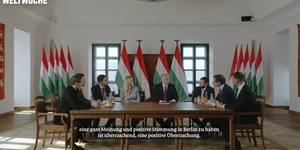This is the first occasion since 1989 when the parliament has met during an election campaign. This is not the result of some sudden natural disaster or an epidemic, but because Fidesz strategists decided the party would benefit from repeating its campaign promises (the 14th monthly pension, the home-building programme) in another public forum. The Socialists naturally responded by saying their MPs would not attend the session - thus presumably furnishing Fidesz with further ammunition.
Of course, the campaign started like all others. It is true that the Socialists began their poster campaign long before the official start of the elections but events nonetheless seemed to be taking their normal course. Fidesz, the opposition party, answered the early challenge by reminding voters of the promises the Socialists made in the 2002 elections. These early moves left the parties neck and neck at the beginning of the year. The second part of the campaign, the competition between the parties' manifesto promises, has not yet taken place.
Fidesz will unveil its formal manifesto on March 19, at the congress where the party will choose its prime ministerial candidate. Until then, enemies keen to tear the party's manifesto apart will have to content themselves with small crumbs unveiled at the various stages of Viktor Orbán's tour of the country. On the other hand, the Socialists have only a development programme, to be financed with EU money, which is hardly a typical election manifesto, susceptible to criticism.
Neither party has much interest in repeating the largely symbolic campaign of four years ago. Mr Orbán even admitted this. "Travelling the country, I frequently meet people who say I shouldn't talk about the nation, they want to know how they and their families can make ends meet," he said at Fidesz's 2003 congress. This has come to define the party's campaign. Fidesz is trying to persuade voters that "our party means higher pensions, lower gas bills, more jobs, higher pay and cheaper schools."
This absence of manifestos meant the rival parties were forced to focus ever more sharply on exploiting each other's mistakes. This tendency was heightened by the fact that it was in the interests of the smaller parties, the MDF and the Free Democrats, to draw attention to ever more spectacular facts. But opinion polls show that the process has thus far benefited mainly the government parties and the MDF. This is almost certainly because Fidesz activists were forced, out of sheer hunger for victory, to resort to methods that they would have shied away from in peacetime.
Earlier transgressions could be written off as simple mistakes, but the so-called server affair, when Fidesz employees were accused of hacking in to the Socialist Party's computers, was clearly a major error. The party leadership did not deny that the Socialists' campaign material was downloaded, but a failure to recognise responsibility or name those culpable confirmed the image of Fidesz as an aggressive party. The Socialists would like to suggest that Fidesz, having won office, would criminalise domestic politics and public life.
Fidesz has tried several times to demonise their opponents. The party went to considerable lengths to highlight similarities between the Socialists' slogan "One country, One man, One programme," and Adolf Hitler's 1938 slogan "One People, One empire, One leader." The comparison seems to have had little effect on voters.
The campaign took a new turn last week when the MDF started to question the honesty of Fidesz's tactics. The MDF produced a recording which showed that a Fidesz MP had tried to blackmail his MDF opponent into withdrawing from the campaign. Though Zoltán Bagó, the MP in question, denied he had any such intention, his party reacted swiftly, withdrawing him from the elections and excluding him from the party.
Viktor Orbán wrote a letter apologising to Ibolya Dávid, president of MDF.
The Bagó affair could turn out to be the key that lets the MDF into parliament. The experience of this one MDF candidate turns out not to have been a one-off, and circumstantial evidence suggests that Bagó's attempts at blackmail were carried out on orders from high up in the party, at least according to the MDF. Several MDF candidates claim to have been told the same thing in similar terms: that Fidesz would pay a 'dividend' if it won the elections, helping the candidates' professional advance if they stood down in their constituencies.

















